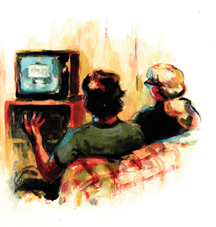 |
 |
| current issue |  | past issues |  | send a letter/news |  | address update |  | advertise |  | about us |  | alumni home |
Features
Out FrontPage 2 of 5

|
As the school year ended, April was feeling proud but overwhelmed. By stepping forward as spokesman, he'd become the contact person for what felt like every Granite Stater unsure of his or her sexuality. "I received so many calls from people who were struggling with their sexual identity, including older people who had nobody to talk to," he recalls. "At one point I thought, 'I can't help another middle-aged man.' I was so exhausted trying to be everything to everybody."
While the students were away for the summer, the controversy quieted somewhat, and in the fall the Gay Students Organization decided to hold a dance. "We were kids," says Ann Philbin '76. "We just wanted a normal college life." Roma Baran '74G remembers the organization as "this little group of ordinary, nice, pleasant, well-meaning people. We didn't picket or shout or sit in. Our level of activism was pretty benign." So were campus attitudes. In October 1973, The New Hampshire published the oh-so-'70s results of an unscientific survey: Of 485 students who responded, "not only did over half smoke marijuana regularly and a whopping 70 percent engage in frequent sexual activity, but an overwhelming 90 percent had no objection to having a gay organization on campus."
The day after the dance, a committee of trustees said that while UNH looked into its legality, the Gay Students Organization could hold no more social events.
Then things began to happen fast. The university asked the state superior court whether it had the authority to revoke the group's recognition and limit its activities to lectures and discussions. Eight days later, the American Civil Liberties Union sued in federal court, alleging that the ban on social functions violated group members' rights under the first and 14th amendments.
A play called "Coming Out" had already been scheduled for December. The new rules meant the gay students could sponsor the play but not the social event they'd planned afterward. When the students offered Thomson free tickets to the play, he responded with a note saying that he wanted both the play and the group's members barred from campus.
Though the play involved some same-sex kissing, all might have gone smoothly if not for a few nonstudents who distributed copies of an explicit magazine called Fag Rag outside the auditorium. Several UNH administrators quickly told reporters that the Gay Students Organization was not responsible; nevertheless, the incident provided new ammunition for opponents. The Union Leader quoted salacious passages from the magazine, warning parents to beware of gay students' "predatory pursuit" of their children. It also published dozens of readers' letters reviling gay people—including one noting that a farmer finding his bulls engaged in homosexual acts "would slaughter them all."
A week after the play, Thomson raised the stakes. "Either you take firm, fair and positive action to rid your campus of socially abhorrent activities," he wrote the trustees, "or I as governor will stand solidly against the expenditure of one more cent of taxpayers' money for your institutions." A Union Leader editorial writer called this threat the perfect incentive to reverse UNH's "pansy-pampering actions."
Meanwhile, members of the Gay Students Organization were facing their own ultimatum: Come out to your families before the publicity does it for you. While April and secretary-treasurer Lou Kelly '74 were still doing much of the talking for the group, others had also begun speaking out, at trustees meetings and other public functions. It was only a matter of time before people noticed, as Bob Kruger '73 discovered when a high school classmate approached him at a trustees meeting and thanked him for standing against the gays. Kruger had to tell him that actually he was there supporting his fellow members of the Gay Students Organization.
Page: < Previous 1 2 3 4 Next >
Easy to print version

